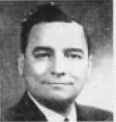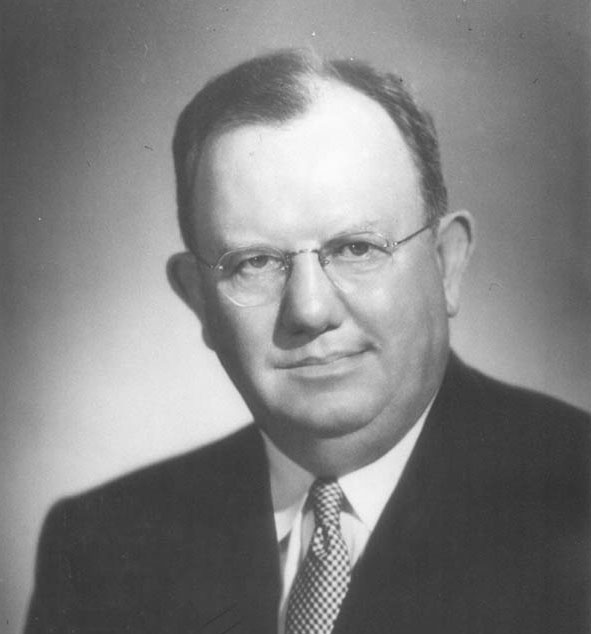
Homer Earl Capehart was an American businessman and politician from Indiana. After serving in the United States Army during World War I, he became involved in the manufacture of record players and other products. Capehart later served 18 years (1945–1963) in the U.S. Senate as a Republican from Indiana. Initially an isolationist on foreign policy, he took a more internationalist stance in later years; he retired after a narrow defeat for a fourth term in 1962.

The 1998 United States Senate elections were held on November 3 and seen as an even contest between the Republican Party and Democratic Party. While the Democrats had to defend more seats up for election, Republican attacks on the morality of President Bill Clinton failed to connect with voters and anticipated Republican gains did not materialize. The Republicans picked up open seats in Ohio and Kentucky and narrowly defeated Democratic incumbent Carol Moseley Braun (Illinois), but these were cancelled out by the Democrats' gain of an open seat in Indiana and defeats of Republican Senators Al D'Amato and Lauch Faircloth. The balance of the Senate remained unchanged at 55–45 in favor of the Republicans. With Democrats gaining five seats in the House of Representatives, this marked the first time since 1934 that the party not in control of the White House failed to gain congressional seats in a mid-term election and the first time since 1822 that this party failed to gain seats in the mid-term election of a President's second term. These are the last Senate elections that resulted in no net change in the balance of power. This is the last time Democrats won a U.S. Senate race in South Carolina.
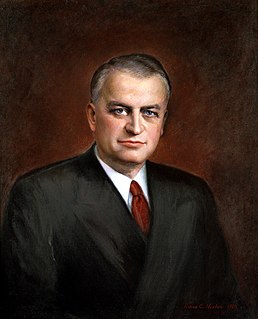
Kenneth Spicer Wherry was an American businessman, attorney, and politician. A member of the Republican Party, he served as a U.S. Senator from Nebraska from 1943 until his death in 1951; he was the minority leader for the last two years.

The 1962 United States Senate elections was an election for the United States Senate which was held in the middle of President John F. Kennedy's term. His Democratic Party made a net gain of four seats from the Republicans, increasing their control of the Senate.

The 1950 United States Senate elections occurred in the middle of Harry S. Truman's second term as President. As with most 20th-century second-term mid-terms, the party not holding the Presidency made significant gains. The Republican opposition made a net gain of five seats, taking advantage of the Democratic administration's declining popularity during the Cold War and the aftermath of the Recession of 1949. The Democrats held a narrow 49-to-47-seat majority after the election. This was the first time since 1932 that the Senate Majority Leader lost his seat, and the only instance of the majority leader losing his seat while his party retained the majority.

The United States Senate elections of 1944 coincided with the re-election of Franklin D. Roosevelt to his fourth term as President. The Democrats retained their large majority, although they lost a net of one seat to the Republicans.

The 1986 United States House of Representatives elections was held on November 4, 1986, in the middle of President Ronald Reagan's second term in office while he was still relatively popular with the American public. As in most midterm elections, the President's party—in this case, the Republican Party — lost seats, with the Democratic Party gaining a net of five seats and cementing its majority. These results were not as dramatic as those in the Senate, where the Republicans lost control of the chamber to the Democrats.

The 84th United States Congress was a meeting of the legislative branch of the United States federal government, composed of the United States Senate and the United States House of Representatives. It met in Washington, D.C. from January 3, 1955, to January 3, 1957, during the third and fourth years of Dwight D. Eisenhower's presidency. The apportionment of seats in the House of Representatives was based on the Seventeenth Census of the United States in 1950.

The 2006 United States Senate election in West Virginia was held November 7, 2006. Incumbent Democrat Robert Byrd won re-election to a ninth term. He was sworn in on January 4, 2007. However, he died in office on June 28, 2010, before the end of his term. This was Robert Byrd's closest re-election.

The 2008 United States Senate election in West Virginia was held on November 4, 2008. Incumbent Democratic U.S. Senator Jay Rockefeller won re-election to a fifth term. As of 2021, this is the last time a Democrat won West Virginia's Class 2 Senate seat.

The 2000 U.S. Senate election in California was held on November 7, 2000. Incumbent Democratic U.S. Senator Dianne Feinstein won re-election to her second full term.

The 2010 United States Senate election in Hawaii took place on November 2, 2010 concurrently with elections to the United States Senate in other states as well as elections to the United States House of Representatives and various state and local elections. The primary elections were held on September 18, 2010. Incumbent Senator Daniel Inouye, also the President pro tempore, secured the Democratic nomination with over 88 percent of the vote over his sole challenger, businessman Andy Woerner, while former state legislator Campbell Cavasso won the Republican nomination with two-thirds of the primary vote.

The 1998 United States Senate election in Colorado was held November 3, 1998, alongside other elections to the United States Senate in other states as well as elections to the United States House of Representatives and various state and local elections. Incumbent Republican U.S. Senator Ben Nighthorse Campbell won re-election to a second term by a landslide. This was the first time a Republican had been elected to the Class 3 Senate seat from Colorado in 30 years; as of 2021, is the last time the Republicans have won the Class 3 Senate seat from Colorado, and the last time that a Native American was elected to the United States Senate.
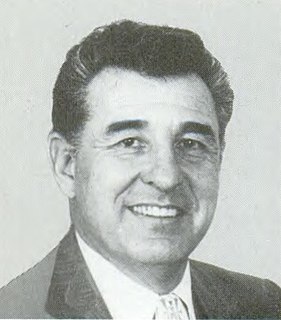
The 1992 United States Senate election in Colorado was held on November 3, 1992. Incumbent Democratic U.S. Senator Tim Wirth decided to retire instead of seeking a second term. Democratic nominee Ben Nighthorse Campbell, a U.S. Representative, won the open seat. Campbell switched to the Republican Party in 1994.

The 1986 United States Senate election in Washington was held on November 3, 1986. Incumbent Republican U.S. Senator Slade Gorton ran for re-election, but was defeated by former Transportation Secretary Brock Adams. However, Gorton would later be returned to Washington's other Senate seat in 1988.

The 1956 United States Senate election in Pennsylvania was held on November 6, 1956. Incumbent Republican U.S. Senator James H. Duff sought re-election to another term, but was defeated by the Democratic nominee, Joseph S. Clark, Jr.
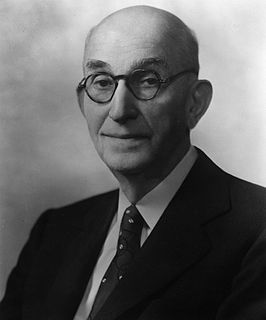
The 1950 United States Senate elections in Arizona took place on November 7, 1950. Incumbent Democratic U.S. Senator Carl Hayden ran for reelection to a fifth term, defeating Republican nominee Bruce Brockett in the general election. Brockett was formerly the Republican nominee for governor in both 1946 and 1948.

The 1956 United States Senate election in Indiana took place on November 6, 1956. Incumbent Republican U.S. Senator Homer Capehart was re-elected to a third term in office, defeating former U.S. Secretary of Agriculture Claude Wickard.

The 1930 United States Senate election in Arkansas took place on November 4, 1930. Incumbent Democratic Senator Joseph Taylor Robinson was re-elected to a fourth term in office. He defeated Tom W. Campbell in the Democratic primary.

The 1962 United States Senate election in Indiana took place on November 6, 1962. Incumbent Republican U.S. Senator Homer Capehart ran for re-election to a fourth consecutive term in office, but was narrowly defeated by Democratic State Representative Birch Bayh.


